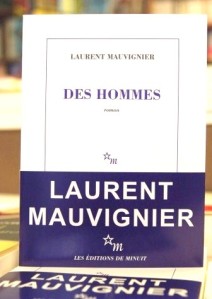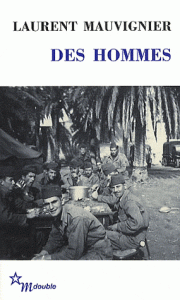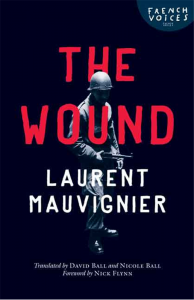Patricia M.E. Lorcin
University of Minnesota
What sort of wounds does war leave? On men and women? On society? Laurent Mauvignier’s remarkable novel, published in French as Des Hommes in 2009, deals with the personal and collective trauma resulting in France from the Algerian War of Independence (1954-62). The English title, The Wound (2015), is evocative of the actual trauma left by the war whereas Des Hommes suggests, and indeed the whole book is about, the differing ways in which a group of relatives and their friends handle the memory of what was an appalling episode in the history of both France and Algeria. As such, it stands for society as a whole and sets the tone for the pervasive symbolism present in the text.
 The book is divided into four sections, Afternoon, Evening, Night and Morning, each representing a moment in time relative to the war or its aftermath. Afternoon and Evening are about the wound – the traumatic sequences of the war. Night, the longest section of the novel, traces the trauma-forming events of the war, whereas Morning, like the morning after a drunken binge, concerns the memory and reflective nostalgia that emerged from the final paroxysm of violence once independence was declared, when the Algerians reclaimed their land while the pieds-noirs fled their homes and farms. The novel revolves around two main characters, Rabut, the narrator, and his cousin, Bernard, both of whom served in Algeria during the war. Bernard, now nicknamed Woodsmoke (Feu-de-Bois in the French), “stinks” like the war’s memory. Indeed, his nickname is redolent of the war’s residual embers in France, permanently smoldering to flare up in unexpected situations and places.
The book is divided into four sections, Afternoon, Evening, Night and Morning, each representing a moment in time relative to the war or its aftermath. Afternoon and Evening are about the wound – the traumatic sequences of the war. Night, the longest section of the novel, traces the trauma-forming events of the war, whereas Morning, like the morning after a drunken binge, concerns the memory and reflective nostalgia that emerged from the final paroxysm of violence once independence was declared, when the Algerians reclaimed their land while the pieds-noirs fled their homes and farms. The novel revolves around two main characters, Rabut, the narrator, and his cousin, Bernard, both of whom served in Algeria during the war. Bernard, now nicknamed Woodsmoke (Feu-de-Bois in the French), “stinks” like the war’s memory. Indeed, his nickname is redolent of the war’s residual embers in France, permanently smoldering to flare up in unexpected situations and places.
Woodsmoke, who is seriously disturbed, has abandoned his children and wife – the daughter of a former colon – in Paris and lives the life of an outsider, drifting, like smoke, into family gatherings where he is tolerated in varying degrees by all present. Their attitudes towards him range from negative to indifferent to condemnatory, in much the same way as French society’s attitudes do to the Algerian War. There are family issues, particularly between those of mother and son, which suggest that his digressive personality has deep roots. But if Bernard has always been an oddball it is the Algerian war that has tipped him over the edge turning him into the semi-alcoholic drifter he has become. Thus, the fractured relationship between mother and son suggests the fraught connection between France and Algeria.
The novel opens in a French village at an afternoon birthday party for Solange, Bernard’s only advocate and the one sibling to whom he is relatively close. When Bernard/Woodsmoke joins the party silence falls on the room like the dampening snow that has begun to fall outside: “a cottony silence, [as] snow had started to fall again…” (8), a cold silence as if to muffle the heat of past anger. But Woodsmoke reeks of the past and his presence throws the party into disarray, culminating in his raining insults on Chefraoui, the one French-Algerian present at the party. As if to mimic wartime action when soldiers sought out and harassed the families of the fellagha, Woodsmoke goes to Chefraoui’s home and frightens his wife and children by his unwelcome and agitated presence. Although he does not harm them, the incident serves as a segue to the next section, Evening.
Here, Mauvignier introduces the reader to the tensions that resulted from the war. Its participants, in this case those who had attended the party, had made “…little promises … never to say what it was like over there” (89), but the war’s past is not so easily put to rest. Rabut tries to make sense of Bernard’s behavior as he reflects on the past of both their family and the war. Voices of the past – Bernard’s in particular – plague Rabut and interrupt his sleep as he is transported back in time to their conscription and the war. The section ends with a description of the nighttime train ride that took new recruits to Marseille and then on to Algeria. Always at night, shrouded in darkness and silence, “[a]s if to sneak out of France” (100), stealthily departing to avoid the anti-war or anti-conscription contingents whose regular demonstrations hindered smooth progress to the war zone.
Night is a time of dreams and nightmares and Mauvignier takes us back to the war in a nightmarish flashback. It is this section, the most important of the book, which makes this novel an anti-war classic. It is not a partisan account of the Algerian War, nor does Mauvignier have a political ax to grind; rather it is a comprehensive exposition of the traumas inflicted on, or faced by, all sides: Algerians, metropolitan French serving in Algeria, and pieds-noirs. There is no right or wrong side, just the horrors each inflicts on the other, and the resulting mayhem. Identities are destroyed or manufactured: heroes made out of killers, killers made out of heroes or, more prosaically, the loss or creation of social and personal identity by the undercutting of the existing social fabric.
“What happens [?] –first, how very fast the soldiers smash in the doors, and charge into the house with the guns in their hands…” (105). The opening paragraphs of the section, describing a raid on the houses of a village suspected of harboring rebels, captures the brutality and fear – the fear on both sides: the brutality of the soldiers to mask their fear but also the numbing fear of the women and children as they are herded out of their homes. When the search reveals neither rebels nor arms, in frustration a soldier, Nivelle, turns and shoots a little girl. A life wasted: an oblique reference to the Nivelle Offensive of 1916 when so many lives were squandered along the Chemin des Dames. War, past or present, is one huge blunder. The village is then torched. It could be a description of any recent war: Vietnam, Afghanistan, Iraq. As the soldiers go from village to village the smell of smoke clings to their clothes and fills the air. “Woodsmoke”: a reminder of war’s insanity.
 Successive incidents of this nature unsettle Bernard. He is reminded of Oradour-sur-Glane and wonders how the inhabitants of the hamlets around his home would react to soldiers razing the place to the ground. As the war starts to get to him and he watches the atrocities on both sides mount up, he thinks more and more often of the Occupation and inwardly reflects: “that here we’re like the Germans back home, we’re no better than them” (163). If Bernard is unsettled by the behavior of his fellow conscripts, he is equally unnerved by the FLN’s (Front de Libération nationale) responses. The tortured flayed arms of the French army doctor left to die in the dust, the daunting night watches, or the “betrayal” of seemingly loyal Algerians, heighten fear and distort the moral compass of the participants. Using Bernard as his foil, Mauvignier builds a convincing portrait of the accumulated anxieties and fears that lead to post-traumatic stress disorder. It turns men, like Bernard, into specters of themselves, like Woodsmoke, while indelibly marking his battle-weary companions.
Successive incidents of this nature unsettle Bernard. He is reminded of Oradour-sur-Glane and wonders how the inhabitants of the hamlets around his home would react to soldiers razing the place to the ground. As the war starts to get to him and he watches the atrocities on both sides mount up, he thinks more and more often of the Occupation and inwardly reflects: “that here we’re like the Germans back home, we’re no better than them” (163). If Bernard is unsettled by the behavior of his fellow conscripts, he is equally unnerved by the FLN’s (Front de Libération nationale) responses. The tortured flayed arms of the French army doctor left to die in the dust, the daunting night watches, or the “betrayal” of seemingly loyal Algerians, heighten fear and distort the moral compass of the participants. Using Bernard as his foil, Mauvignier builds a convincing portrait of the accumulated anxieties and fears that lead to post-traumatic stress disorder. It turns men, like Bernard, into specters of themselves, like Woodsmoke, while indelibly marking his battle-weary companions.
Morning sees a sleepless Rabut mulling over the previous day’s events and their connection to the war. He decides he hates Bernard, not for any family reason, but because of his inescapable daily presence, “dragging around our mutual history in his whole body” (217). Rabut tells his wife, who wonders at his sleepless nights, “we cry at night because one day we’re branded for life by such horrific images that we can’t bear to tell them to ourselves” (217). The book ends with Rabut’s flashback to Oran in 1961. Independence was only months away and yet a crazed anticipation gripped the population as Europeans and Algerians rampaged through the city. The pieds-noirs conscious of what they were about to lose; the Algerians of what they were about to gain, and the harkis caught in between.
The signature of the Evian accords stripped all three groups of their former identities. Mireille, Bernard’s pied-noir wife, finds herself in France without the slightest idea of how to manage without the domestic help she has grown up with. She is transformed from a self-confident coquette in charge of her destiny into a querulous household drudge, resenting Bernard and blaming him for what she sees as her miserable life, thus reflecting the betrayal felt by the pied-noir community as a whole. The Algerians, once the losers, regain their dignity amidst scenes of euphoria prompting Rabut to reflect that his parents’ generation must have felt a similar exhilaration when the Germans left France. The most tragic of all were the harkis, transmuted from loyal supporters to treasonous pariahs. The French deserted the majority when they withdrew, prefiguring the American abandonment of their Vietnamese supporters at the fall of Saigon in 1975. Harkis who were left behind were slaughtered by their fellow countrymen as traitors in a ferocious reiteration of other post-war purges. The purging of French society of its collaborators after World War II is a case in point. Mauvignier’s description of the disavowal and savage brutality meted out to the harkis by both French and Algerians is chilling. Rabut watches in horror as hundreds of harkis are made to drink gasoline and then set alight by their compatriots, reminding us that fire is still used to purge society of its “heretics” and “undesirables.” An unnerving throwback to much earlier times.
Mauvignier’s novel is one of the most impressive fictional portrayals of the Algerian war to date. The weaving together of the conflicts of family and nation encapsulates the Algerian war’s political and psychological aftermath as well as serving as a mnemonic for all wars. David and Nicole Ball’s translation is a fine one. They have captured the pace and atmosphere of the original making the English version as powerful as the French. It is a compelling read, which should not be missed.
Laurent Mauvignier, The Wound, (translated from the French by David Ball and Nicole Ball, with a forward by Nick Flynn), Lincoln, University of Nebraska Press, 2015.

